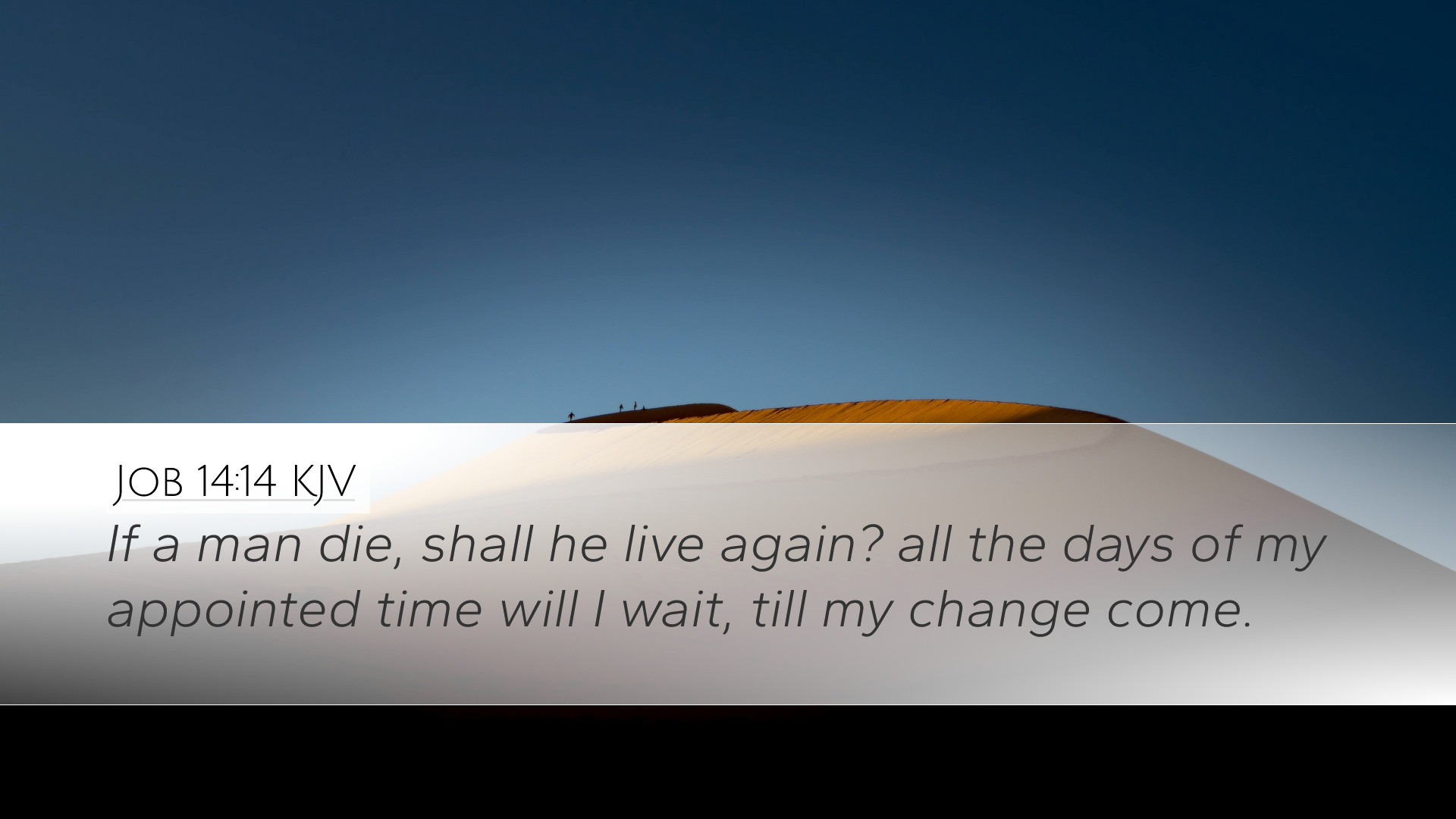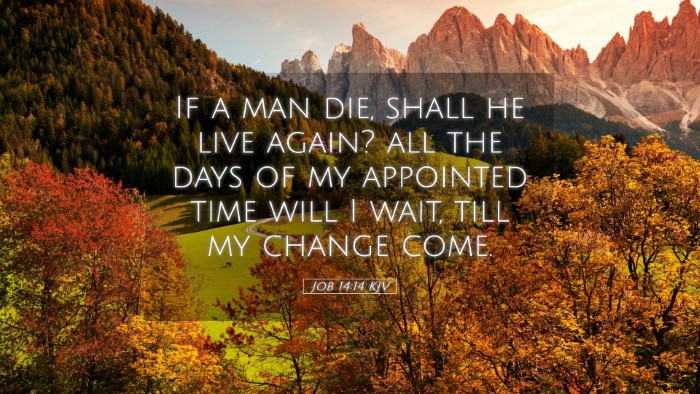Old Testament
Genesis Exodus Leviticus Numbers Deuteronomy Joshua Judges Ruth 1 Samuel 2 Samuel 1 Kings 2 Kings 1 Chronicles 2 Chronicles Ezra Nehemiah Esther Job Psalms Proverbs Ecclesiastes Song of Solomon Isaiah Jeremiah Lamentations Ezekiel Daniel Hosea Joel Amos Obadiah Jonah Micah Nahum Habakkuk Zephaniah Haggai Zechariah MalachiJob 14:14
Job 14:14 KJV
If a man die, shall he live again? all the days of my appointed time will I wait, till my change come.
Job 14:14 Bible Commentary
Commentary on Job 14:14
Job 14:14 states, "If a man dies, shall he live again? All the days of my appointed time will I wait, till my change come." This verse captures the profound existential question regarding life after death, a central theme in the Book of Job and the human experience. Below is a synthesis of insights drawn from public domain commentaries by Matthew Henry, Albert Barnes, and Adam Clarke.
Overview of the Context
Job speaks in this verse, reflecting on mortality and the hope of resurrection. As he grapples with the immense suffering and the apparent silence of God, his thoughts turn towards the ultimate fate of humanity. This moment reveals not only his despair but also his longing for a future hope beyond the grave.
Annotation and Insights
1. The Question of Resurrection
Matthew Henry notes that Job’s inquiry, "If a man dies, shall he live again?" is both a personal lament and a universal question. It showcases the struggle of humanity with the finality of death.
- Henry emphasizes that this question reflects Job’s desire for understanding and resolution regarding human suffering and the afterlife.
- He aligns this with the expectation of a future resurrection, which, though not fully revealed in the Old Testament, is anticipated in Job’s thoughts.
2. The Waiting Period
Albert Barnes elaborates on Job's statement, "All the days of my appointed time will I wait, till my change come." Barnes interprets "appointed time" as the duration of Job's suffering and earthly life.
- He posits that Job acknowledges a period of waiting before receiving a revelation or change, which aligns with the anticipation of an eventual transformation, possibly alluding to resurrection.
- This patience amid suffering showcases Job's faith, suggesting he believes that despite his trials, divine justice and mercy exist beyond the grave.
3. The Nature of Human Change
Adam Clarke focuses on the implications of "till my change come." He explains that this "change" might refer to death itself as a transformation from life in a sinful world to a state of purity and peace.
- Clarke argues that Job's understanding acknowledges the inevitability of death as a precursor to a transformed existence.
- This perspective reflects a nuanced understanding of life and death, indicating that Job harbors hope despite his present misery.
Theological Reflections
This verse invites the reader to engage with the core theological questions of existence, suffering, and the afterlife.
1. Humanity's Fragility
The sheer fragility of human life is evident in Job’s reflections. The biblical text begins a discourse on mortality and humanity's search for meaning beyond physical existence. The acknowledgment of death prompts a deeper theological inquiry into God’s purposes and promises.
2. The Promise of Resurrection
Job’s question resonates with an emerging biblical theme concerning resurrection, foreshadowing a sure hope that is more fully realized in the New Testament. The longing for life after death is reflected in Christian theology, where Christ’s resurrection guarantees believers’ future hope.
3. The Role of Faith in Suffering
Job exemplifies steadfast faith amid sorrow, awaiting divine intervention. His words challenge believers to contemplate their response to suffering and the assurance of God’s ultimate justice. The integration of faith and doubt is a profound relationship in the spiritual journey.
Conclusion
Job 14:14 serves as a poignant reminder of the complexities of human existence, embodying deep questions regarding life, death, and the hope that transcends our earthly trials. The combined insights from the commentaries illuminate Job’s profound faith and the anticipation of resurrection—a hope that resonates through the pages of scripture, offering comfort and assurance to all who wrestle with similar inquiries.


